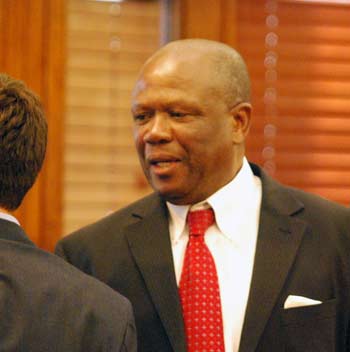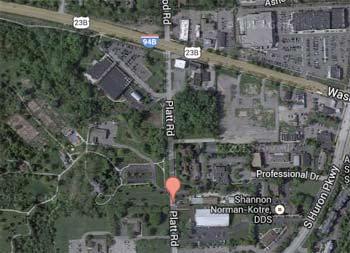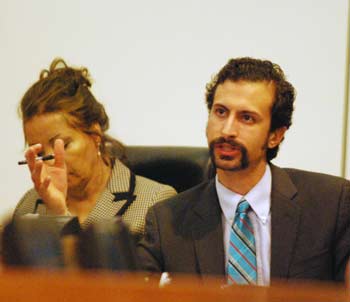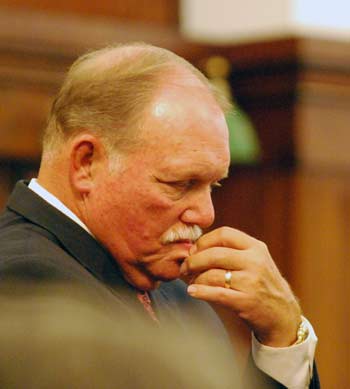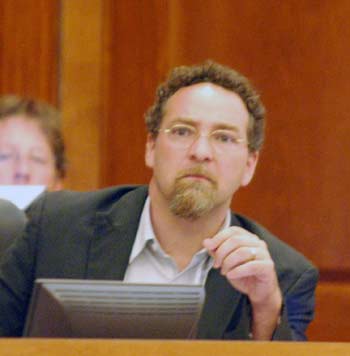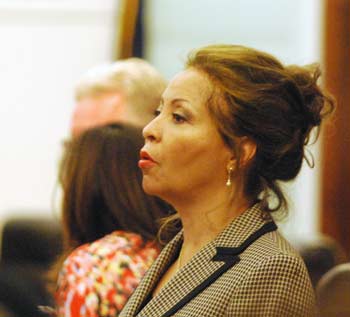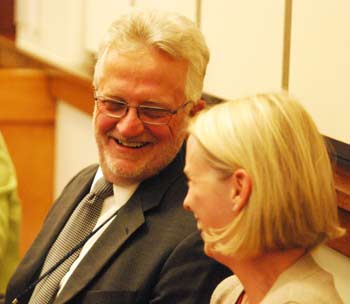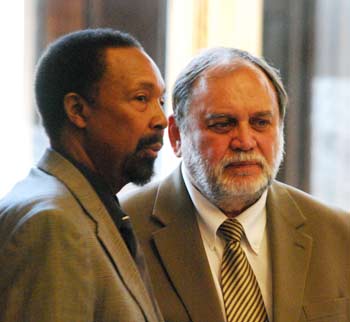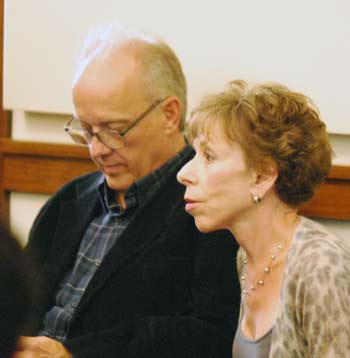County Board Debates Infrastructure Issues
Washtenaw County board of commissioners meeting (Sept. 4, 2013): A five-hour meeting was dominated by two debates: funding for a new software system for the Washtenaw County trial court, and the future of county-owned property on Platt Road.
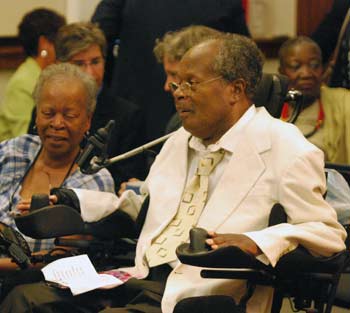
Charles Beatty Jr. attended the Sept. 4 Washtenaw County board of commissioners meeting to accept a resolution in honor of his father, Charles Beatty Sr. The board supports naming the Head Start building at 1661 LeForge in Ypsilanti – owned by the county – in honor of the late Charles Beatty Sr., who was influential in early childhood education. (Photos by the writer.)
For the site at 2260 and 2270 Platt Road – the former juvenile center – staff have proposed a process that focuses on possibly using the site for affordable housing. A $100,000 planning grant is available to explore that option. However, several commissioners – while expressing support for affordable housing in general – wanted to look at a broader range of alternatives, including the possibility of selling the site, which some believe could be worth $2 million. After more than an hour of debate, the board voted to postpone action until its Sept. 18 meeting, directing staff to prepare an alternative resolution to consider.
Another lengthy debate focused on the funding mechanism for new trial court software, estimated to cost $2.3 million. The vendor of the current system went out of business several years ago, and replacement is critical. Donald Shelton, chief judge of the trial court, told commissioners: “If this [software] system goes down, our judicial system in the county simply stops operating.”
Some commissioners wanted a more formal mechanism to repay the county’s investment in the system, which includes nearly $1.3 million from capital reserves. The board eventually passed a resolution stating that revenues from the court’s electronic filing fees will be used to reimburse the capital reserves. E-filing fees – likely to be $6 per filing – are expected initially to generate only about $45,000 in revenues. The e-filing will start with civil cases, with phased roll-out to other cases, including criminal and probate. At some point, e-filing might become mandatory.
A range of other significant action items yielded far less discussion. The board gave initial approval to a new micro loan program for small businesses, to be managed by the Center for Empowerment and Economic Development. Also getting initial approval was a range of grants administered by the county’s office of community & economic development, as well as a resolution that would give blanket approval in the future to nearly 30 annual entitlement grants received by the county totaling an estimated $8.8 million, beginning in 2014. Currently, each of those grants requires separate annual approval by the board.
Commissioners also gave initial approval to strengthen the county’s affirmative action plan, as well as other nondiscrimination in employment-related policies. The primary change adds a prohibition of discrimination on the basis of gender identity, gender expression, and sexual orientation. Community activist Jim Toy and Jason Morgan, who serves on the board of the Jim Toy Community Center, spoke during public commentary to support the changes.
Other items receiving an initial vote from the board include: (1) adding three new full-time jobs for stewardship of the county nature preserves; (2) adding a new 10-bed treatment program for female teens in the county’s youth center that will create a net increase of 5.46 jobs; and (3) budgets for the county’s public health and community support & treatment service (CSTS) departments.
During the meeting, the board also honored the nonprofit Dawn Farm on its 40th anniversary, and recognized Bill McFarlane, the long-time Superior Township supervisor who recently announced his resignation due to health issues. Commissioners also supported renaming the county-owned Head Start building in Ypsilanti in honor of the late Charles Beatty Sr., a pioneer in early childhood education.
Topics that emerged during public commentary included a plea to urge state legislators to repeal Michigan’s version of a “stand your ground” law. Board chair Yousef Rabhi indicated his intent to bring forward such a resolution on Sept. 18 – similar to one passed by the Ann Arbor city council on Aug. 8, 2013. Rabhi also plans to introduce a resolution on Sept. 18 advocating for stronger cleanup standards of 1,4 dioxane – the contaminant in an underground plume caused by Pall-Gelman’s Scio Township operations. The Ann Arbor city council passed a resolution on Sept. 3, 2013 related to this issue.
Also on Sept. 18, a public hearing will be held to get input on a proposed increase to the Washtenaw County tax that supports services for indigent veterans and their families. The current rate is 0.0286 mills – or 1/35th of a mill. The new proposed rate of 1/30th of a mill would be levied in December 2013 to fund services in 2014. It’s expected to generate $463,160 in revenues. The public hearing was scheduled by commissioners at their Sept. 4 meeting.
Platt Road Property
The Sept. 4 agenda included a resolution to create an advisory group to look at options for the county-owned Platt Road site in Ann Arbor, where the old juvenile center was located. [.pdf of Platt Road staff memo]
The idea of an advisory committee to help with the dispensation of this property was first floated at the board’s July 10, 2013 meeting, as part of a final vote on an overall strategic space plan for county facilities. The space plan proposed demolishing the former juvenile center and exploring redevelopment of the site at 2260 and 2270 Platt Road for affordable housing, alternative energy solutions, and county offices. Details of how the advisory committee would be appointed, as well as the committee’s formal mission, was an item to be worked out for a board vote at a later date.
Those details were brought forward on Sept. 4. The original Sept. 4 resolution called for a nine-member committee with the following composition:
- 2 county commissioners
- 1 Ann Arbor city councilmember
- 2 residents from the adjacent neighborhood
- The executive director of the Ann Arbor Housing Commission [Jennifer L. Hall]
- The director of Washtenaw County parks & recreation [Bob Tetens]
- The director of the Washtenaw County office of community & economic development [Mary Jo Callan]
- The Washtenaw County infrastructure management director [Greg Dill]
The timeline called for at least three committee meetings with a consultant later this year to develop the community design process, followed by public workshops in January of 2014. A final plan with recommendations would be completed and presented to the county board by May of 2014.
The proposal was heavily oriented toward the option of putting affordable housing on that site, which raised concerns for several commissioners. A staff memo listed several elements that would be explored, including: (1) affordable rental housing by the Ann Arbor housing commission; (2) an affordable housing green demonstration pilot project; (3) connection to the adjacent County Farm Park; (4) ReImagine Washtenaw Avenue design principles; and (5) other identified community priorities, such as geothermal, solar panels or community gardens.
According to the staff memo, the planning work would be funded by $100,000 in grants from the U.S. Department of Housing and Urban Development and the Michigan State Housing Development Authority, with funds to support the development of affordable housing. The money was part of a $3 million federal grant awarded to the county in 2011 and administered by the county’s office of community & economic development (OCED).
Platt Road Property: Board Discussion
Dan Smith (R-District 2) noted that the resolution didn’t include the option of selling the land. Perhaps it makes sense to include a real estate agent among the list of advisory committee members, he said. He hadn’t heard commissioners reach consensus about ruling out the option of selling the land – either in part or in its entirety.
Ronnie Peterson (D-District 6) expressed surprise about the resolution, implying that there must have been other meetings about this topic that he didn’t know about. He said he had supported the concept of looking at options for the property, which he believed could be valued at $2 million or more. He supported involvement of neighbors in giving input into the property’s future.
However, the resolution before them was more far-reaching than he had expected, Peterson said. He felt it was earmarking money for an initiative – affordable housing – that the board hadn’t discussed or approved. He expressed concern for the county’s overall budget, noting that there will be cuts made in the coming year.
Yousef Rabhi (D-District 8) replied to Petersen, noting that the resolution passed by the board on July 10 had included an amendment to the language, in order to address concerns that Peterson had raised at that meeting – including an explicit statement that the board had ultimate control over what happens to the Platt Road site.
Andy LaBarre (D-District 7) had been integral in putting together this resolution, Rabhi noted, because the property is in LaBarre’s district. Rabhi assured Peterson that he hadn’t missed any meetings, and that this resolution was an evolution from the July 10 discussion.
Conan Smith (D-District 9) told Peterson he was excited by this community process. Smith wanted to understand Peterson’s concern: Was it that there aren’t sufficient options cited in the resolution? Peterson replied that the planning process is tapping into funding that hadn’t been approved by the board. He wondered where the money had come from, and whether it could be used for other projects.
Brett Lenart, OCED’s housing and infrastructure manager, reiterated information from the staff memo – that the funding came from a HUD sustainable communities regional planning grant. The overall grant is funding the Washtenaw Avenue corridor project and a range of other efforts, he said. The Michigan State Housing Development Authority (MSHDA) committed $100,000 in matching funds. One component of those matching funds is furthering sustainable solutions for at-risk populations, he said.
Lenart told commissioners that the Platt Road site seemed like a good opportunity to marry a county asset with the affordable housing goals supported by the grant. It’s near the Washtenaw Avenue corridor, near public transportation and job opportunities.
Conan Smith clarified with Lenart that the funds must be used for planning. Smith then said he agreed with Peterson in that the resolution didn’t direct the advisory committee to explore a broad range of options. “We’re pre-determining the outcome for this site, with this resolution,” Smith said. “We’re going to angle it toward affordable housing in some way.”
Lenart replied that the staff is suggesting that the primary discussion for the site should focus on affordable housing. If these grant funds are used for planning, then there needs to be a good faith effort to advance the cause of affordable housing, he said.
Conan Smith noted that the board hasn’t discussed whether affordable housing is its priority for the Platt Road property. He said he shared Peterson’s concern in that regard.
Rolland Sizemore Jr. (D-District 5) said he hadn’t known about this proposal, even though he’s a member of the county’s space committee. He also objected to having four directors on the advisory committee, suggesting that they could delegate that responsibility.
Sizemore asked what the $100,000 would be used for. Lenart replied that it would be used for a community design process, including fees for architects and consultants to run the public meetings and develop recommendations. Sizemore expressed skepticism about using that amount simply for planning. “I just don’t like the way this looks,” he said, to spend that much money just to tell the board what they should do with 13-14 acres of land. “If you’ve got that kind of money to throw around, then I think we’ve got a big problem.”
Lenart noted that if the planning funds aren’t spent at the Platt Road site, then the funds will be used for planning at other locations that might be suitable for affordable housing.
LaBarre reported that he’s talked to residents in these neighborhoods, and no one ever brought up the option of selling that site. This process is inclusive, he said, and he supported it. Commissioners won’t be obligated to act on the recommendations that will be delivered as the result of this process, he noted.
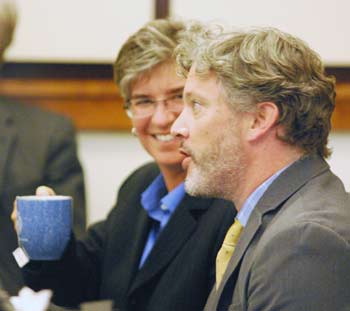
Brett Lenart, housing and community infrastructure manager for the county’s office of community & economic development (OCED). Seated next to him is Mary Jo Callan, OCED director.
Dan Smith stated his priorities for the property. He’d like to sell the portion along Platt Road, and reserve a portion adjacent to County Farm Park to make a greenway or park. He noted that 5 out of the 9 committee members, as proposed, are either commissioners or staff. If the board really wants diverse input, then they should get rid of some of the county representatives and include more residents.
Dan Smith also cautioned against asking citizens to do a lot of work on this committee, only to have it possibly ignored by the board. He felt commissioners should have a better idea of its priorities for the site, before asking an advisory committee to make recommendations.
Peterson said he didn’t mind exploring options or including citizen input. But it’s important that the board make sure the community receives the full value from that property, regardless of what is done with it. But the proposed resolution leads the county into the housing business, he said, and that concerns him. Peterson added that he doesn’t know what other affordable housing options are in the works, or what other planning efforts might benefit from this $100,000.
Rabhi read from the original July 10 resolution – specifically, LaBarre’s amendment that had been added to create the advisory committee. Rabhi also noted the additional language that had been included as a friendly amendment to address Peterson’s concerns at the time [italics include friendly amendment language]:
Be it further resolved that the board of commissioners create a nine-member Platt Road community advisory committee to review and develop a recommendation for the disposition of the county’s Platt Road site. The composition and charge of the advisory committee will be determined by the board of commissioners at a later date, provided however that the board of commissioners shall have the authority to ultimately determine the disposition of the Platt Road site.
Peterson said he’d given his trust when he voted for that resolution on July 10. He had assumed that names of people to serve on the committee would be brought forward. He didn’t know any other plans were in the works.
Felicia Brabec (D-District 4) indicated that she thought the committee would bring forward pros and cons for each option for the site, not just one recommendation. It seemed like the committee was being directed to lean toward one option, without exploring the full spectrum. Lenart replied that the intent is to present a concept for affordable housing at that site, that’s rooted in information and community input. He said if there’s no interest on the board in pursuing affordable housing there, then OCED would find another project that could use the planning funds.
Conan Smith floated the idea of amending the resolution to call for the advisory committee to deliver an initial high-level alternatives analysis, with a recommendation. Then the board could direct the committee and staff to implement the planning process for whatever alternative is chosen.
Platt Road Property: Board Discussion – Amendment
Dan Smith proposed amending the resolution to create more diversity on the committee – adding an Ann Arbor city council designee and three county residents, including one with real estate experience. Alicia Ping (R-District 3) objected to singling out Ann Arbor for additional representation. Although the land is located in Ann Arbor, it’s owned by the county – paid for by all county taxpayers, she noted. Yousef Rabhi proposed alternative wording, considered as a friendly amendment to Smith’s version, to add four slots to the committee for Washtenaw County residents, including at least one with experience in real estate.
Outcome on amendment: It passed on a 6-3 vote, over dissent from Ronnie Peterson (D-District 6), Rolland Sizemore Jr. (D-District 5) and Andy LaBarre (D-District 7).
Platt Road Property: Board Discussion – Final Debate
Alicia Ping asked additional questions about the planning grant. Brett Lenart explained that it couldn’t be used to plan exclusively for a park or commercial development – and that affordable housing had to be at least considered in good faith in order for the planning grant to be used.
Ping thought Ronnie Peterson had raised some good points, and she felt more comfortable doing a high-level alternatives analysis, as Conan Smith had proposed.
Andy LaBarre noted that the resolution passed by eight commissioners on July 10 – Rolland Sizemore Jr. had been absent – called for a nine-member advisory committee to review and develop a recommendation for the disposition of the Platt Road site. He sensed that there wasn’t support for the current resolution, but he hoped it wouldn’t cause them to “piddle away time on this unnecessarily.” If the board wants to do something with the site, they should make that decision relatively quickly, he said. Whatever they do, LaBarre said, he would advocate for involving residents near the site.
Yousef Rabhi asked how other funds from the $3 million grant were being spent. Lenart replied that the grant was funding planning efforts for the Washtenaw Avenue corridor, working to strengthen neighborhood groups and associations, helping new tenants at the Hamilton Crossing complex in Ypsilanti with literacy, budgeting and other life skills, and improving pedestrian crossings on the south side of Ypsilanti. The grant also had funded some of the work for the Ann Arbor Downtown Development Authority’s Connecting William Street project, he said, and is paying for the Arts Alliance to incorporate public art into some infrastructure projects.
Rabhi clarified with Lenart that affordable housing must be considered in order for the planning to be eligible for this grant funding, but affordable housing doesn’t have to be part of the final recommendation. The key is that affordable housing will be part of the discussion, Rabhi said, along with other options. He added that no commissioner is opposed to affordable housing.
Peterson agreed, saying that the issue is the proper use of this grant funding. He noted that the eastern part of the county, which he represents, is the reason why this kind of funding is available to the county – because of the low income residents there. He hoped the board could establish a committee with no budget. He didn’t think this grant was the appropriate funding mechanism, and he didn’t think OCED was the appropriate department to handle this project. The facilities staff should be in charge, he said, noting that the county has policies and procedures for the disposal of property.
Rabhi then suggested tabling the item until the board’s Sept. 18 meeting. He asked Greg Dill, the county’s infrastructure management director, to work with commissioners and staff to bring forward an alternative resolution on Sept. 18.
Dan Smith moved to postpone the resolution.
Outcome: The motion to postpone passed unanimously.
Trial Court Software
At their Sept. 4 meeting, commissioners acted on two items related to a new case management software system for the Washtenaw County trial court.
The board was asked to give final approval to the selection of a new record-keeping software system for the court that’s estimated to cost $2.3 million. The Tyler Odyssey Case Records Management System will replace an outdated software system that hasn’t been supported by the previous vendor since 2005, when the vendor went out of business.
The original resolution, put forward at the board’s Aug. 7, 2013 meeting, had identified the following funding sources for this project: (1) a $551,998 refund from the state related to an unfinished pilot project; (2) $200,000 from an anticipated 2013 surplus in the trial court budget; (3) $700,000 from the county’s IT fund balance; and (4) $899,463 from the county’s capital reserves, to be repaid with any trial court surplus starting in 2014.
However, some commissioners weren’t comfortable with the funding sources that were identified, so an alternative resolution was brought forward during the Aug. 7 meeting that did not include references to funding sources. An amendment to that alternative resolution – made after considerable discussion and procedural maneuverings – stated that the board approved the selection of this software system, and directed the county administrator to develop a maintenance and implementation plan, and to identify funding sources by the time of the board’s Sept. 4 meeting.
The funding sources were identified in a separate Sept. 4 resolution: (1) a $551,998 refund from the state related to an unfinished pilot project; (2) $200,000 from an anticipated 2013 surplus in the trial court budget; (3) $300,000 from the county’s IT fund balance; and (4) $1,299,463 from the county’s capital reserves, to be repaid with any trial court surplus starting in 2014.
A staff memo accompanying the funding resolution also notes that an annual software maintenance and support fee – starting at $188,933 – will be offset by revenue from fees associated with all Washtenaw County trial court electronic filing.
Commissioners discussed the approach to funding for about an hour on Sept. 4 with Donald Shelton, chief judge of the trial court.
Trial Court Software: Board Discussion
Dan Smith (R-District 2) asked to pull out the funding resolution for a separate vote.
Alicia Ping (R-District 3) asked about the maintenance funding. Beyond the fees from e-filing, how will the rest of the annual maintenance costs be paid for? Greg Dill, director of infrastructure management, replied that costs would be covered from the county’s IT maintenance fund.
In response to another query from Ping, chief judge Donald Shelton said that the e-filing fee is in addition to the regular filing fee. It’s estimated to be $6 per filing, with an initial annual projection of $45,000 in revenues. The e-filing will start with civil cases, with phased roll-out to other cases, including criminal and probate. Eventually, he added, it will likely be mandatory to file documents electronically. So those initial annual revenue estimates, which Shelton characterized as conservative, are expected to increase. All revenues from e-filing will be used to offset the annual maintenance costs. Revenues will increase as more documents get filed electronically, and savings from not using paper documents will also increase, he said.
What happens when the e-filing revenues exceed the maintenance costs: Who gets the extra revenue? Ping wondered. Shelton recalled that when he was mayor of Saline, someone pointed out that action being taken might create a parking problem. “I said, ‘Oh, I pray for a parking problem downtown every day,’” Shelton joked. He said it’s not the court’s intention to profit from e-filing, other than to cover costs to support the system.
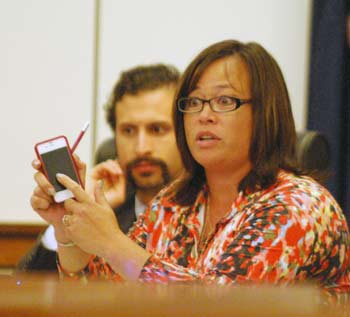
Alicia Ping (R-District 3) explains that her husband – attorney David Shand – showed her how he could access documents electronically from other county courts on his phone.
Conan Smith (D-District 9) pointed out that the previous resolution had indicated that e-filing revenues would be used to pay back the county’s capital reserves. Now, it’s flipped, he said – the e-filing is going to cover operating (maintenance) costs, and are not repaying the county’s capitalization of the system.
Dill said the funding model is very much the same as the original proposal. The county administration has talked to the trial court about reducing its operating budget by $200,000 annually, Dill said. Those reductions can be applied to repay the county’s capital reserves, which are helping to fund the initial cost of the new system.
Shelton added that this new system will enable the trial court to meet its targets for structural budget reductions. He pointed out that for eight years, the court’s software wasn’t supported by the vendor because that company went out of business. So during that time, the county didn’t pay annual maintenance costs. That’s almost $700,000 that wasn’t spent, he said, because the court has been “limping along in our Studebaker.” The court was able to do that because one of its employees was able to keep the system running. However, that employee is no longer working for the county. “If this system goes down, our judicial system in the county simply stops operating,” Shelton said.
Shelton noted that an estimated 40% of the county residents will come into contact with the judicial system at some point in their lives – for things like a divorce, or a child who’s in trouble, or a crime. Having a new system to help run the operation is a need, not a want, he said. It’s an investment.
Conan Smith said he understood the need. But his concern is about how that system is funded, given the myriad countywide needs. He’d prefer to see a fee schedule developed to cover the capitalization and operations costs of this new system. Smith suggested perhaps a $30 increase to the current $150 regular filing fees, beyond any charges for e-filing.
Shelton replied that the court is constrained by the state in terms of how much it can charge for filing fees. The state legislature sets those fees – for example, it costs $100 to file a lawsuit. There’s more flexibility in electronic filing fees, which are subject to negotiation between the state and the court, he said.
Shelton noted that he has pledged to reduce the court’s operating budget, which will be made possible by this new system.
Smith described Shelton’s pledge as “rock solid.” However, Smith added, the court’s leadership will change soon. [Shelton can not run for re-election because he'll be over 70 years old when his current term ends. The state constitution requires that judicial candidates at the time of election must be younger than 70 years old.] “Then we’re in a situation with folks who didn’t cut that deal,” Smith said. The priorities of a new court leadership might shift, so Smith wanted a formal agreement that lays out how the project will be capitalized from court funds.
Shelton replied that he can’t bind future judges any more than Smith can bind future commissioners. However, he added that he could speak for the bench in that when they make a commitment, they keep it.
Rolland Sizemore Jr. (D-District 5) voiced concern that additional software upgrades will be needed in other county departments and in the county-funded district courts. He cited expenses associated with moving the dispatch operations from downtown Ann Arbor to the county’s Zeeb Road facility. Dill reported that staff is working on a 10-year technology plan, which would address Sizemore’s concerns.
Yousef Rabhi (D-District 8) agreed with Conan Smith about paying back the county’s capitalization costs. Rabhi reminded Dill that they’d talked about using the e-filing revenues to pay back the county’s capital reserves – not to offset maintenance costs. Shelton clarified that the e-filing revenues won’t be coming directly to the court. Rather, Tyler Technologies will be deducting those fees from its maintenance bill to the courts – that’s why it made sense for the e-filing revenues to offset maintenance, he said.
Rabhi said the point is to build in a way that the court can reimburse the capital reserves, to offset the county’s $1.3 million investment. The resolution needs to include language that spells out how that will happen.
Dan Smith (R-District 2) introduced some new issues. He said he’s heard anecdotally that the new system isn’t needed, but Dill and IT manager Andy Brush have spent a lot of time looking into it, and he’d go with their recommendation. He also noted that the courts had chosen to set themselves up in a different way from other county departments, getting their budget as a lump sum that’s governed by a memorandum of understanding. Given that, he has difficulty approving $1.3 million from the county’s capital reserves to a unit over which the board has essentially no financial oversight.
Dan Smith said he appreciated Shelton’s commitment, but the board has experienced recent situations where there were misunderstandings about promises that were made “that got us into a whole lot of hot water.” What really counts isn’t what’s talked about at the board table, Smith said, “but what we actually vote on. We need these types of things in writing.”
Conan Smith pointed out that from a budgetary standpoint, there’s no cash available to allocate to the capital reserves. The court will receive an annual maintenance bill, minus the amount of e-filing revenues. “I’d rather see a much more solid, structured revenue solution,” he said.
Shelton clarified that the maintenance bill is covered by the county’s IT fund, and isn’t part of the court’s lump sum budget. So any reductions in that maintenance bill will be money that the IT fund doesn’t have to expend. Responding to a query from Ronnie Peterson (D-District 6), Shelton noted that the annual maintenance cost includes future upgrades.
Shelton again reiterated that with the new system in place, the court will be able to meet its $200,000 budget reduction target. Over six years, that $200,000 annual reduction will cover the county’s $1.3 million capital investment in the system, he said.
Shelton noted that all county boards in the state chafe at the independence of courts as a separate unit of government. The courts are not a county department, he said. However, he felt the relationship between the board and the courts in Washtenaw County was better than any of Michigan’s other 82 counties. And although the board doesn’t have absolute control over the court’s budget, he said, the court gives a detailed report about how its money is spent, so that the administration knows exactly what’s happening with the court’s budget, and why.
Shelton also highlighted a “performance dashboard” that’s posted on the court’s website, so anyone can view the fluctuations in filings and dispensations.
Conan Smith replied that his concern is to find a predictable funding source that doesn’t compromise the county’s other investment priorities. He noted that he’s been talking with Mary Jo Callan, director of the county’s office of community & economic development, about the possibility of “social impact” bonds, as an example.
Trial Court Software: Board Discussion – Amendment
Rabhi proposed an amendment to add a resolved clause to the resolution:
Be it further resolved that the offsets to the annual software maintenance and support costs created by the e-filing revenue will be used to reimburse the $1,299,463 of capital investment from the capital reserve fund.
After some additional discussion, Ping proposed an amendment to Rabhi’s amendment, adding this sentence: “Once the capital fund is reimbursed, additional offset funds will be allocated to the tech plan fund balance.”
Outcome on Ping’s amendment to Rabhi’s amendment: It was unanimously approved on a voice vote.
So the final version of the Rabhi’s amendment to the main resolution stated:
Be it further resolved that the offsets to the annual software maintenance and support costs created by the e-filing revenue will be used to reimburse the $1,299,463 of capital investment from the capital reserve fund. Once the capital fund is reimbursed, additional offset funds will be allocated to the tech plan fund balance.
Outcome on Rabhi’s amended amendment: Commissioners unanimously approved the amendment on a voice vote.
Trial Court Software: Board Discussion – Final Vote
Rabhi then called the question, a procedural move intended to force a vote. Curtis Hedger, the county’s corporation counsel, noted that six votes are required in order to pass a motion to call the question.
Outcome on motion to call the question: It passed unanimously.
The board then voted on the main resolution, as amended, on funding of the Tyler software system.
Outcome: The resolution passed on an 8-1 vote, over dissent by Dan Smith (R-District 2).
Trial Court Software: Final Approval
Both resolutions – the funding resolution, and the general resolution for the Tyler system that was given initial approval on Aug. 7 – were on the board agenda for a final vote later in the meeting.

From left: Greg Dill, director of infrastructure management, and commissioner Dan Smith (R-District 2).
There was additional discussion, generally repeating themes and information that had been covered earlier in the meeting. Conan Smith highlighted the fact that the county would be taking on an additional expense for maintenance that will be absorbed by the IT fund. He wanted to know what cuts would be made to the IT budget in order to accommodate that additional maintenance expense.
Greg Dill replied that as his staff looked at the mix of all IT needs throughout the county, they felt confident they could absorb the trial court maintenance costs. The overall IT funding, even with additional maintenance costs, is sufficient to take care of the needs of the entire organization, he said. Kelly Belknap, the county’s finance director, explained that part of the IT budget includes revenues from what’s called the “1/8th mill” fund, which pays for infrastructure needs. Not all of the IT funding comes from the county’s general fund.
Outcome on final approval for the funding resolution: It passed on an 8-1 vote, over dissent by Dan Smith (R-District 2).
Outcome on final approval for the general Tyler software resolution: It passed on an 8-1 vote, over dissent by Kent Martinez-Kratz (D-District 1). He did not indicate why he voted against the resolution. He had voted in favor of it on Aug. 7.
Trial Court Child Care Fund
In another item related to the trial court, the board was asked to give initial approval to 2013-2014 state child care fund expenditures of $9,425,785 for the trial court’s juvenile division and county dept. of human services. About half of that amount ($4,712,892) will be eligible for reimbursement from the state. [.pdf of budget summary]
According to a staff memo, the child care fund is a joint effort between state and county governments to fund programs that serve neglected, abused and delinquent youth. Part of this year’s funding will support a new 10-bed treatment program that will be housed in the county’s youth center facility, opening in November of 2013. From the staff memo:
The treatment program in its initial phase will exclusively provide treatment services to females aged 12-17 using an integrated therapeutic treatment model. The program will offer a short-term 90 day option as well as a 6 to 9 month long-term treatment option. The second phase of treatment programming will expand services to males aged 12-17.
The new program is expected to generate revenue from out-of-county treatment referrals.
The expenditures will result in a net increase of 5.46 jobs. A total of 10.46 full-time equivalent positions will be created, and 5 FTEs will be eliminated.
Trial Court Child Care Fund: Board Discussion
Dan Smith (R-District 2) clarified with county administrator Verna McDaniel that the county’s cost for this program is about $4.7 million. McDaniel stated that the funds are subject to the county’s memorandum of understanding with the trial court. Donald Shelton, chief judge of the trial court, clarified that only about a third of the funds are subject to the MOU. The MOU does not cover funding to the county’s department of human services or the youth center.
Felicia Brabec (D-District 4) wondered how the new treatment program fits into the county’s continuum of care. She also wanted to make sure that adolescents in Washtenaw County have access to the program.
Lisa Greco, director of children’s services for the county, explained that the new program would expand therapy treatment services that the county currently purchases from other providers. The program would involve the child and entire family, she said – it would be part of the entire continuum of care that the county provides.
Linda Edwards-Brown, the trial court’s juvenile and probate court administrator, noted that the program will initially serve only females, but the plan is to eventually expand to include males.
Brabec wondered how this program would be different from detention. Greco explained that there are parts of the juvenile facility that are secured, and other areas that are not secured. Activities in the new treatment program would take place in the unsecured areas, she said. There will also be a team approach to treatment and intervention.
Directing her comments to commissioner Dan Smith, Greco noted that all positions in the county’s youth center are 50% funded from the state child care fund. [Earlier in the meeting, Smith had objected to the resolutions on the agenda that added jobs to the county's payroll.]
Yousef Rabhi (D-District 8) pointed out that this program is built first and foremost for Washtenaw County residents. The county wants to create partnerships with neighboring counties and courts, but that’s not the program’s primary focus, he said. Secondarily, those services could be made available to residents outside the county.
Edwards-Brown noted that the trial court’s first response is to try to keep kids at home, and there are several in-home programs that are available. It’s the court’s last resort to place adolescents in a treatment facility.
Rolland Sizemore Jr. (D-District 5) highlighted this project as an example of different county departments – including the infrastructure management group – working together.
Outcome: Commissioners gave initial approval to the child care fund expenditures, over dissent by Dan Smith (R-District 2). A final vote is expected on Sept. 18.
Micro Loan Program for Small Business
A countywide micro loan program for small businesses was on the Sept. 4 agenda for initial approval. The resolution would authorize the county’s office of community & economic development to contract with the Center for Empowerment and Economic Development to manage this program. CEED already handles a smaller micro loan program focused on the eastern side of the county. [.pdf of CEED micro loan proposal]
Micro loans would range from $500 to $50,000, for businesses that can’t get conventional financing. CEED has a $5 million borrowing capacity from the U.S. Small Business Administration, and expects to make $300,000 in micro loans in the next two years in Washtenaw County. The county would provide $45,000 out of revenues from levying the Act 88 millage. Of that amount, $35,000 would be used to seed a loan loss reserve fund and $10,000 would be designated for initial operating costs.
To be eligible for a micro loan, businesses must be based in Washtenaw County and have been turned down by two financial institutions for loans over $20,000. Other requirements include: (1) a business plan for businesses that are less than 3 years old; (2) a marketing plan for businesses that are 3 years or older; (3) two years of financial statements and tax returns; and (4) a personal financial statement.
The county is allowed to levy up to 0.5 mills under Public Act 88 of 1913, but currently levies a small percentage of that – 0.06 mills, which will bring in $696,000 this year. It’s used for programs run by the county’s office of community & economic development, and to fund the county’s MSU extension office. Act 88 does not require voter approval. It was originally authorized by the county in 2009 at a rate of 0.04 mills, and was increased to 0.043 mills in 2010 and 0.05 in 2011.
Last year, Conan Smith (D-District 9) of Ann Arbor proposed increasing the rate to 0.06 mills and after a heated debate, the board approved the increase on a 6-5 vote. [See Chronicle coverage: "County Board Debates, OKs Act 88 Tax Hike."] Increasing this tax was one of several revenue options that the county commissioners discussed at their Aug. 8, 2013 working session, as part of a broader strategy to address a projected $3.9 million budget deficit in 2014. [See Chronicle coverage: "County Board Eyes Slate of Revenue Options."]
The county has identified economic development as one of its main budget priorities.
Micro Loan Program for Small Business: Board Discussion
Alicia Ping (R-District 3) asked for examples of how this type of loan has been used successfully. Todd Van Appledorn with CEED responded that these loans are intended for entrepreneurs who have trouble getting loans through traditional sources, like banks or credit units. Types of businesses range from small manufacturers to retail shops or even consultants. Since CEED started its micro loan program in 1993, they’ve made over $5 million in loans, he said.
Generally, banks require two years of credit history before lending, Van Appledorn said, and new businesses don’t have that track record. Or some entrepreneurs have credit issues that don’t relate to their business – if they’ve had medical expenses, for example. The average micro loan made by CEED is $10,000.
Ping recalled that when she served on the Saline city council, a micro loan program was operated through the city’s economic development council. All the loans got paid back, she said, although not all the businesses were successful. A restaurant that’s been in downtown Saline for 20 years had received a micro loan. She thought it would be a great county program.
Yousef Rabhi (D-District 8) asked how this program fits into the county’s overall economic development strategy. Tony VanDerworp with the county’s office of community & economic development explained that existing programs cover the high tech and life sciences sectors, as well as larger businesses. Now, OCED is working to find ways to support locally owned small businesses, he said. Efforts include this proposed micro loan program, changes to procurement policies, and support for the local food sector, among other things.
Responding to another question from Rabhi, Van Appledorn described CEED as an intermediate lender. The county’s program and seed funding will allow CEED to borrow through the U.S. Small Business Administration for the micro loans.
Rolland Sizemore Jr. (D-District 5) wondered what entity will decide who gets the loans. That’s CEED’s job, Van Appledorn said. What’s the success rate? Sizemore asked. For a smaller eastern Washtenaw County micro loan program, from July 2009 through April 2013, 14 loans were approved totaling $270,000, VanDerworp reported. No loans have defaulted.
Ronnie Peterson (D-District 6) praised CEED, noting that it has received national attention for its work. He hoped to see the program expand even further.
Dan Smith (R-District 2) said he supported the activities, but was concerned about using taxpayer dollars to fund businesses that can’t get conventional financing. People start businesses in other ways, he noted, such as using their home equity, personal credit, or loans from friends and family.
Smith also pointed out that the loan committee meets virtually, and that’s a concern. The public should have an opportunity to see how their money is being spent, and he wondered whether these meetings have to comply with the Michigan Open Meetings Act. Van Appledorn said that CEED follows the SBA’s guidelines for this program, and has never had a problem in the past 30 years handling it this way.
Outcome: Commissioners gave initial approval to the micro loan program, over dissent from Dan Smith (R-District 2). A final vote is expected on Sept. 18.
Increase in Parks Stewardship Staff
A resolution to create three new full-time jobs for stewardship of Washtenaw County’s nature preserves was on the Sept. 4 agenda for initial approval.
The positions include: (1) a park laborer with a salary range of $31,507 to $41,766; (2) a park associate/principle planner with a salary range of $40,253 to $61,195; and (3) a stewardship coordinator, with a salary range of $43,373 to $56,586.
The additional jobs reflect a change approved by the county board nearly a year ago. At their Sept. 19, 2012 meeting, commissioners voted to amend the Natural Areas Ordinance No. 128, which established the county’s natural areas preservation program in 2000.
The change removed a previous restriction that only 7% of millage funds could be used for management or stewardship. The goal was to use $600,000 per year for management and stewardship. Of that, roughly $240,000 would be used for ongoing stewardship activities, and $360,000 would remain to be invested in a dedicated reserve for long-term land stewardship.
According to a staff memo, the county’s parks system manages more than 4,500 acres of land in 13 parks and 22 preserves. In addition to the 556 acres of property already “actively” managed in the nature preserves, the staff also have active stewardship responsibilities for another 372 acres of prime natural areas within the county parks system. Overall, staff has identified 1,868 acres – or roughly 42% of the system’s current total acreage – as core conservation areas.
Funding for these new positions would be paid for entirely from the countywide natural areas millage, which was initially approved by voters in 2000 and renewed in 2010. The current 0.2409 mill tax raises roughly $3.5 million in annual revenues, and runs through 2021.
Increase in Parks Stewardship Staff: Board Discussion
Board chair Yousef Rabhi (D-District 8) described it as the right move to make, reflecting the county’s value of protecting its ecosystem. He noted that the city’s of Ann Arbor’s natural areas preservation program has a budget of about $700,000 to staff a system about half the size of the county’s natural areas, so “there’s always more that we can do.” It’s a step in the right direction, he said.
Dan Smith (R-District 2), who serves on the county parks & recreation commission, pointed out that during this meeting the board would be increasing the county’s overall headcount by nearly 10 FTEs, including the increase to the parks staff. It helps that some of the positions will be paid for out of a dedicated millage – as is the case with the parks staff – but it’s still an increase in positions, he said.
Rolland Sizemore Jr. (D-District 5), who also is a member of the parks & rec commission, praised Tetens and the parks staff. He noted that the intent is to slow down the amount of acquisitions and shift to a maintenance mode. However, he also shared concerns in general about increasing staff size.
Outcome: Commissioners gave initial approval to the staff increase. A final vote by the board is expected on Sept. 18.
Non-Discrimination Policy
At its Sept. 4 meeting, commissioners were asked to give initial approval to reaffirm and update the county’s affirmative action plan, as well as other nondiscrimination in employment-related policies. [.pdf of staff memo and policies]
The primary change adds a prohibition of discrimination on the basis of gender identity, gender expression, and sexual orientation.
The resolution’s three resolved clauses state:
NOW THEREFORE BE IT RESOLVED that the Washtenaw County Board of Commissioners reaffirms its intent to prohibit discrimination in Washtenaw County against any person in recruitment, certification, appointment, retention, promotion, training and discipline on the basis of race, creed, color, gender, gender identity, gender expression, sexual orientation, national origin, age, handicap, veteran status, marital status, height, weight, religion and political belief.
BE IT FURTHER RESOLVED that the Washtenaw County Board of Commissioners shall strive to promote a workforce that welcomes and honors all persons and that provides equal opportunity in employment.
BE IT FURTHER RESOLVED that the Washtenaw County Board of Commissioners directs the Human Resources / Labor Relations Director to update the Affirmative Action Plan, as well as policies Prohibiting Discrimination in Employment, Sexual Harassment, and the County’s Statement of Equal Employment Opportunity to reflect the Boards commitment and reaffirmation described herein.
Non-Discrimination Policy: Public Commentary
During public commentary at the start of the meeting, community activist Jim Toy directed his first comments to commissioner Conan Smith (D-District 9).
Toy recalled when he’d spoken to the Ann Arbor city council decades ago in front of then-mayor Al Wheeler, who was Smith’s grandfather. “I looked at the mayor and said, ‘Mayor Wheeler, I am totally intimidated because you look exactly like my grandfather,’” Toy said. He added: “I feel no such intimidation tonight.”
Toy thanked the board for its continued support of human and civil rights, and supported expansion of the county’s affirmative action plan and related policies. It has symbolic, political, psycho-social and personal weight, he said. The diverse components of human sexuality – sex, gender, gender identity, gender expression and sexual orientation – “must receive stated protection,” Toy said. “Otherwise, we all are at risk of discrimination and harassment and assault, up to and including murder.” He ended his remarks by telling commissioners: “Namaste – walk in sunshine.”
Jason Morgan, a board member of the Jim Toy Community Center and director of government relations at Washtenaw Community College, also spoke in support of the changes. He appreciated the county’s support of LGBT protections and human rights protections. The county has been known for a long time as a leader in this regard. He noted that other supporters – including Katie Oppenheim of the Michigan Nurses Association – were there to urge commissioners to support the changes.
Outcome: Commissioners unanimously voted to give initial approval to the non-discrimination changes. A final vote is expected on Sept. 18.
Funding for Office of Community & Economic Development
In addition to the micro loan program reported in this article (see above), several other items were on the agenda related to funding for programs managed by the county’s office of community & economic development, totaling nearly $2 million:
- $88,263 from the federal dislocated worker training (DWT) national emergency grant [.pdf of staff memo for DWT grant]
- $16,277 in federal funding for the Michigan Works! Service Center Operations [.pdf of staff memo for Michigan Works funding]
- $50,000 in federal Trade Adjustment Assistance (TAA) employer-based training foundation funding [.pdf of staff memo for TAA funding]
- $287,860 in federal Dept. of Energy weatherization funding [.pdf of staff memo for weatherization funds]
- $274,792 in federal Emergency Solutions Grant funding. The total program budget is $412,188, which includes $137,396 of in-kind matching contributions. The program supports the Housing Access for Washtenaw County (HAWC) partnership between Salvation Army, the Shelter Association of Washtenaw County and the Interfaith Hospitality Network of Washtenaw County. [.pdf of ESG staff memo]
- $516,156 in federal Community Services Block Grant (CSBG) funds [.pdf of CSBG staff memo]
- $21,828 in discretionary funds from the federal Community Services Block Grant (CSBG) to provide free income-tax preparation for low-income residents [.pdf of discretionary CSBG staff memo]
- $703,214 in federal funding for a senior nutrition program, with a total budget of $873,372. Additional funding comes from a USDA reimbursement of $100,001 and in-kind contributions of $70,157. [.pdf of senior nutrition memo]
The board also was asked to give initial approval to a blanket resolution covering nearly 30 annual entitlement grants received by the county totaling an estimated $8.8 million, beginning in 2014. According to a staff memo, these grants are awarded on a reoccurring basis based on pre-existing state or federal allocation formulas. They require board approval as individual items, which “ends up consuming a significant portion of Board and staff time throughout a given year, as formula grants are on a variety of different fiscal years, and are awarded at several different points throughout the year. Furthermore, the piecemeal nature of the resolutions does not provide a holistic overview of the continuum of services provided to the community by OCED,” the memo states. [.pdf of staff memo regarding blanket grant approval]
There are several categories of grants that will continue to require a board vote, even if this blanket approval is passed. Those categories include:
- competitive grants;
- grants that are not based on pre-established federal or state funding formulas or entitlement formulas;
- new grants, or ones that have not been previously awarded to or administered by OCED;
- grants that would require a county general fund appropriation in excess of the amount approved by the county board in the budget;
- grants that would require a change in OCED position control;
- grants more than $100,000 or 10% more than the anticipated amount, whichever is greater.
Funding for OCED: Board Discussion
In response to a question from Felicia Brabec (D-District 4) about the weatherization grant, program coordinator Aaron Kraft clarified that the grant would fund 40 weatherization jobs in 2013.
Brabec also asked about changes to the senior nutrition program. Andrea Plevek of the OCED explained that because of sequestration and other funding constraints, OCED is working with partner organizations to streamline delivery of meals to senior citizens. Those changes include providing shared meal service at senior centers wherever possible, and reallocating financial resources to local programs based on both demand for service and need. Partners that provide both shared-meal service and home delivery are the Ann Arbor housing commission (Baker Commons); Chelsea Senior Center; Dexter Senior Center; and Northfield Senior Center.
Andy LaBarre (D-District 7), who serves as the board’s representative to the Area Agency on Aging 1-B, asked if there was anything beyond sequestration happening at the federal level, that the county should be aware of. Plevek replied that the state agencies, which pass through federal funding to the county, have prioritized homebound meal delivery. She wasn’t aware of any other action at the federal level.
Ronnie Peterson (D-District 6) asked for a report on the overall impact of federal sequestration. The county receives a lot of federal dollars, he noted, and he’s very concerned about the impact. It’s crucial to know as the administration develops its next budget, Peterson said, because the board will need to decide whether departments that are losing federal funding will get more support from the county to make up the shortfall.
County administrator Verna McDaniel said she’d work with department heads to pull that information together. LaBarre, who chairs the board’s working sessions, said he’d be willing to dedicate an upcoming session to that topic.
Outcome: All OCED items were given initial approval, with final votes expected at the board’s Sept. 18 meeting.
Hearing for Indigent Veterans Services Tax Hike
Commissioners were asked to set a public hearing for Sept. 18 to get input on a proposed increase to the Washtenaw County tax that supports services for indigent veterans and their families.

Michael Smith, director of the county’s department of veterans affairs, talks with commissioner Felicia Brabec (D-District 4).
The current rate, approved by the board last year and levied in December 2012, is 0.0286 mills – or 1/35th of a mill. The new proposed rate of 1/30th of a mill would be levied in December 2013 to fund services in 2014. It’s expected to generate $463,160 in revenues.
The county is authorized to collect up to 1/10th of a mill without seeking voter approval. That’s because the state legislation that enables the county to levy this type of tax – the Veterans Relief Fund Act – predates the state’s Headlee Amendment. The county first began levying this millage in 2008. Services are administered through the county’s department of veterans affairs.
Increasing this tax was one of several revenue options that the county commissioners discussed at their Aug. 8, 2013 working session, as part of a broader strategy to address a nearly $4 million projected budget deficit in 2014. See Chronicle coverage: “County Board Eyes Slate of Revenue Options.”
There was no discussion on this item. In addition to the public hearing, the board is expected to vote on the tax hike on Sept. 18.
Outcome: Commissioners set the Sept. 18 public hearing on an increase in the millage to pay for indigent veterans services.
CSTS Budget
Commissioners were asked to give initial approval to the 2013-14 budget for the community support and treatment service (CSTS) department, from Oct. 1, 2013 through Sept. 30, 2014. The $34.96 million budget includes $29.598 million in revenue from the Washtenaw Community Health Organization (WCHO), which contracts with CSTS to provide services for people who are mentally ill and developmentally disabled. Other revenue comes from the Haarer bequest ($165,192), a contract with the county sheriff’s office ($246,846), smaller contracts with other entities, and fee-for-service billing. [.pdf of CSTS budget]
The budget calls for putting six full-time positions and two part-time jobs on “hold vacant” status. Those positions are currently unfilled.
The resolution also authorized county administrator Verna McDaniel to approve a service agreement with the WCHO, which is a separate nonprofit that’s a partnership between the county and the University of Michigan Health System.
CSTS Budget: Board Discussion
Discussion was brief. Felicia Brabec (D-District 4) asked for an explanation about the changes that CSTS is undergoing.
Trish Cortes, WCHO director, reported that over the past fiscal year, the delivery of all direct services has been shifted from WCHO to CSTS. Now, CSTS provides all direct services, under contract with the WCHO. [Further explanation of these changes, and additional discussion among commissioners, took place at the board's April 3, 2013 meeting.]
Outcome: Commissioners unanimously gave initial approval to the CSTS budget. A final vote is expected on Sept. 18.
Public Health Budget
The Sept. 4 agenda included a resolution approving the public health department’s $10.796 million budget for 2013-14, from Oct. 1, 2013 through Sept. 30, 2014. The budget includes $3.553 million in an appropriation from the county’s general fund, and $243,226 from the department’s fund balance. [.pdf of staff memo regarding public health budget]
As part of the budget, the public health department is proposing a net increase of 1.5 full-time equivalent positions. That results from eliminating 4.5 FTEs and creating 6 new positions. In addition, 5 positions will be put on “hold vacant” status, effective Oct. 1.
The resolution also included a proposed fee schedule for vaccines and clinic visits. [.pdf of proposed fee schedule] The minimum fee is proposed to be raised from $30 to $40.
Public Health Budget: Board Discussion
Rolland Sizemore Jr. (D-District 5) noted that public health director Dick Fleece is retiring, and that provides a good time to look at possibly restructuring the department. He also expressed concern over the listing of salary ranges for new positions, rather than giving each position a set salary.
Dan Smith (R-District 2) said he agreed with Sizemore. If changes are going to be made, this is the chance to do it with minimal impact.
Felicia Brabec (D-District 4) pointed out that the staff memo refers to the impact of federal sequestration on the budget, and she wondered when more information would be available on that.
Fleece responded, saying the department had received more information since the staff memo for this resolution was written. The areas that he’d been concerned about were emergency preparedness, HIV/AIDS services, and the Women Infants and Children (WIC) program. The department has subsequently learned that the state of Michigan will absorb the cuts and maintain funding at the current levels, he said.
Conan Smith (D-District 9) thought commissioners should at some point talk about recreating the public health board. Right now, the county board plays that role, he noted, but they lack specific expertise in that area “and we frankly don’t do our due diligence on things that [staff] could probably use a professional board for in public health.” There’s a wide array of resources in this community, he noted, including hospitals and the University of Michigan School of Public Health.
Ronnie Peterson (D-District 6) and Yousef Rabhi (D-District 8) both agreed. Fleece said he’d welcome a public health board, though he noted the department does have an advisory committee that also serves as the health code board of appeals.
Fleece also pointed out that when he was appointed health director, he retained his position as environmental health coordinator, which saved the county the cost of filling that position. He thanked his management team, many of whom attended the meeting, as well as the county’s medical examiner, Jeff Jentzen, who Fleece said attended to show support.
Outcome: The board unanimously approved the public health budget and fee schedule.
2013 Budget Adjustments
A budget adjustment resulting in a $654,670 increase in 2013 general fund revenues and expenses, bringing the total general fund budget to 103,218,903, was on the Sept. 4 agenda for final approval. [.pdf of 2013 budget adjustment chart]
An initial vote had been taken on Aug. 7, 2013, following significant debate and some failed amendments proposed by Conan Smith (D-District 9). His amendments would have restored over $1 million in funding to programs and departments that had been cut in previous budget cycles. During the Aug. 7 meeting, other commissioners expressed general support for his sentiments, but cautioned against acting quickly and not giving sufficient strategic thought to these allocations, which they had seen for the first time that night.
Conan Smith, Alicia Ping (R-District 3) and Dan Smith (R-District 2) had dissented on the vote giving initial approval to the budget adjustments. Board approval is required for budget changes greater than $100,000 or a variance of more than 10%, whichever is less.
The county’s finance staff cited several factors related to the adjustments, including the fact that property tax revenues are $2.3 million higher than anticipated when the budget was approved in December 2012. The county is also receiving $205,344 more in state funding than was originally budgeted, from state liquor tax revenues.
On the expense side, $551,998 will be used to help pay for the trial court’s new records management software system. Those funds come from a refund to the court by the state of Michigan. There will also be an increase of $102,672 in expenses due to a higher substance abuse allocation mandated by Public Act 2 of 1986, and related to the higher liquor tax revenues that the county received. Those funds will go to the county’s designated substance abuse coordinating agency.
The 2013 general fund budget also is not expected to need a previously planned use of $2.8 million from the fund balance.
There was no discussion on this item at the Sept. 4 meeting.
Outcome: Commissioners gave final approval to 2013 general fund budget adjustments, over dissent from Conan Smith (D-District 9).
Naming of Head Start Building
The Sept. 4 agenda included an item to support naming the county’s Head Start building at 1661 LeForge in Ypsilanti in honor of the late Charles Beatty Sr. [.pdf of resolution honoring Charles Beatty Sr.]
Beatty was recognized for his work in education – he was the first African American school principal in Michigan. He served as principal of Ypsilanti’s Harriet Street School – which was renamed Perry School – until 1967, and was instrumental in setting up the Perry Preschool Program and the HighScope Foundation’s Perry Preschool Study. The study was influential in validating the importance of early childhood programs like Head Start.

From left: Former Washtenaw Head Start director Patricia Horne McGee and Maude Forbes, a retired principal of Fletcher and Adams elementary schools in Ypsilanti.
Board chair Yousef Rabhi, who read the resolution aloud, called it a “great day for Washtenaw County.”
By way of background, at its Aug. 7, 2013 meeting, the board approved a 10-year lease of the county-owned Head Start building to the Washtenaw Intermediate School District. [.pdf of lease agreement] The WISD is taking over management of the Head Start program from the county, which has administered it for over four decades. After considerable debate, the board made the decision in late 2011 to relinquish the Head Start program.
The county took out bonds to pay for the construction of the $2.29 million Head Start facility in 2002. Ten years remain on the bond repayment for a total of $1.66 million.
WISD will begin making payments in 2014. Annual payments vary, beginning with $166,862 by Oct. 1, 2014. [.pdf of rent payment schedule] After the final payment, the county would deed the Head Start building and surrounding 11-acre property to the WISD. During the term of the lease, WISD will pay for utilities and basic maintenance, but the county will be liable for structural issues with the building, including roof repairs, broken windows, and other repairs – unless the repairs are caused by WISD action.
WISD superintendent Scott Menzel attended the Sept. 4 meeting, but did not address the board.
Naming of Head Start Building: Public Commentary
Several family members and friends were on hand, and the resolution was presented to Charles Beatty Jr., who told commissioners that this father – also known as “Chief” – would be very proud that the Head Start building was being named after him, because the program had been very near and dear to his heart.
Michael Kinloch, an officer of Kappa Alpha Psi, spoke on behalf of that organization, noting that Charles Beatty Sr. had been a member of the fraternity and had helped on many community service projects. He thanked commissioners for honoring Beatty.
Maude Forbes said she was probably the oldest person in the room to have known Charles Beatty. She’d first met him as a third-grade student at Harriet Street School, where he was principal. In 1953 she graduated from Ypsilanti High School, thanks to his help. In 1957 she was looking for her first teaching job, and he asked her: “Where else would you teach, except with me?” She thanked the commissioners, HighScope, and Pat Horne-McGee, who had worked to make sure that Beatty was recognized. Forbes joked that if Beatty could get someone like commissioner Ronnie Peterson through school, “and have him end up being a recognized citizen and not end up in court, then you know [Beatty had] a lot of talent.”
Larry Schweinhart, president of the HighScope Educational Research Foundation in Ypsilanti, told commissioners that none of the organization’s achievements would have been possible without the generous partnership of Charles Beatty Sr. It’s fitting to name the Head Start building after him, because he’s one of the pioneers who made Head Start possible, Schweinhart said.
Naming of Head Start Building: Commissioner Response
Many commissioners praised Beatty and his lifetime achievements, and thanked his family and friends for attending. Ronnie Peterson (D-District 6) spoke at length about his personal experiences with Charles Beatty Sr., who had been principal at Perry Elementary when Peterson attended there. Peterson described Beatty as a great man who didn’t get the recognition he deserved when he was alive. He thanked Beatty’s family and Pat Horne-McGee for working to make this happen.
Alicia Ping (R-District 3) noted that she attended Perry Elementary for kindergarten, not long after Beatty retired. She’d like to think that he was instrumental in creating the atmosphere in that building, even after he had gone.
Dawn Farm 40th Anniversary
The county board passed a resolution honoring the nonprofit Dawn Farm, which is celebrating its 40th anniversary this year. [.pdf of Dawn Farm resolution] The Ann Arbor city council had passed a similar resolution at its Sept. 3, 2013 meeting.
Dawn Farm offers both residential and out-patient services supporting recovery for alcoholics and drug addicts. The organization was founded in 1973 by Gary Archie and Jack Scholtus in a rented old farmhouse on Stony Creek Road in Ypsilanti. It has grown to include facilities in downtown Ann Arbor.
Dawn Farm’s president, Jim Balmer was on hand to accept the resolution, along with board members Janis Bobrin and Maggie Ladd. Bobrin is the former county water resources commissioner. Ladd is executive director of the South University Area Association. Also attending the Sept. 4 meeting was Charles Coleman, the nonprofit’s Chapin Street project coordinator.
Balmer told commissioners that he didn’t think this kind of program could have survived anyplace other than Washtenaw County. The community’s generosity accounts for the survival of Dawn Farm, he said.
Balmer invited commissioners to the Sept. 8 40th annual jamboree and fundraiser, noting that both founders will be attending. “There will be cake!”
Several commissioners praised Balmer and Dawn Farm for their work.
Honoring Bill McFarlane
Commissioners passed a resolution in honor of Bill McFarlane, the long-time Superior Township supervisor who recently announced his resignation due to health issues. [.pdf of resolution honoring McFarlane]
In introducing the resolution, board chair Yousef Rabhi described McFarlane as a friend to all the commissioners. McFarlane was unable to attend the Sept. 4 meeting, but Rabhi said it would be presented to him at his going-away celebration later this month.
Several commissioners praised McFarlane for his service over the decades, both in Superior Township and in countywide efforts like the Washtenaw Area Transportation Study (WATS) and the county’s police services committee.
Township Sewer Contract Amendment
The amendment of a contract between Washtenaw County, Lyndon Township and Sylvan Township was on the agenda for final approval. [.pdf of original contract]
In February 2013, county commissioners voted to refinance debt for a sewer system in Lyndon and Sylvan townships, on the county’s west side. The resolution authorized the sale of refunding bonds that would be used to pay the remaining principal on existing bonds that were sold in 2004. That year, the county sold $5.115 million in bonds to help the townships pay for the sewer. Of that amount, $2.225 million remained to be repaid, prior to the refunding. The project built sewers at Cavanaugh, Sugar Loaf, Cassidy, Crooked, and Cedar Lakes. It’s funded through special assessments on property around those lakes and payments by the Sugar Loaf Lake State Park and Cassidy Lake State Corrections Facility.
In March 2013, the county received bids for the refunding, with the lowest bid from Hastings City Bank at an interest rate of 1.749838%. As a result of this refunding, only $695,000 in debt remains on this bond issue. Lyndon Township was able to cash reserves and redeemed all of their outstanding debt for this project.
The contract amendments given initial approval by county commissioners on Aug. 7 remove Lyndon Township from any responsibility for debt retirement and reduce the amount of debt for Sylvan Township. All other provisions of the contract remain in place until the bonds are paid off in 2022. Both township boards have previously approved these changes, according to a staff memo.
This sewer system is separate from a controversial water and wastewater treatment plant project in Sylvan Township. For more background on that project, see Chronicle coverage: “County Board OKs Sylvan Twp. Contract.”
Outcome: Without discussion, commissioners gave final approval to the contract amendment.
Communications & Commentary
During the evening there were multiple opportunities for communications from the administration and commissioners, as well as public commentary. In addition to issues reported earlier in this article, here are some other highlights.
Communications & Commentary: Budget Update
Felicia Brabec (D-District 4), who’s leading the budget process for the board, gave an update on activities related to developing the 2014-2017 general fund budget. All departments have been given letters stating the targets for budget reductions. The administration will be bringing forward a draft budget proposal to the Oct. 2 board meeting.
Budget task force meetings on priority areas are continuing. Brabec plans to bring the outcomes of those meetings to the board at a Sept. 19 working session.
The board will receive a third-quarter 2013 budget update from county administrator Verna McDaniel in November.
Communications & Commentary: Repeal “Stand Your Ground” Law
Three people spoke during public commentary urging the board to pass a resolution asking for the repeal of Michigan’s “stand your ground” law. Lefiest Galimore told commissioners that he had addressed the Aug. 8, 2013 meeting of the Ann Arbor city council with the same message. He called it a “vigilante law.” The city councils of Ann Arbor and Ypsilanti have both approved this kind of resolution, he noted. Galimore hoped the county board would do the same, to put pressure on Michigan legislators.
Blaine Coleman, wearing a sign that stated “Black Life Matters,” expressed some surprise that it was so easy to speak to commissioners. [Unlike the Ann Arbor city council, which requires people to sign up for the public commentary at the start of its meetings, there is no sign-up required at the county board session.] He said the law has become a “hunting license” against black men and black boys. “I think it’s perceived that way and I think it’s used that way.” The deeper problem for the past 400 years is that black life is not taken seriously or valued, he said. Rather than spending trillions of dollars on overseas wars, the U.S. government should invest in rebuilding inner cities like Detroit.
Lucia Heinold also urged commissioners to pass a resolution asking Michigan legislators to repeal this state’s version of the “stand your ground” law. She’s talked with a lot of black parents about the fears they have for their children. She hoped commissioners would join the movement to repeal the law. Heinold said she’s worked with the prisoner re-entry program and has come to admire sheriff Jerry Clayton and his work with the neighborhoods.
Later in the meeting, board chair Yousef Rabhi (D-District 8) indicated that he would be bringing forward such a resolution at the board’s Sept. 18 meeting. He said he felt that more discussion needed to happen, which he hoped would happen on the 18th.
Conan Smith (D-District 9) spoke in support of a resolution, but hoped that it would go further than simply calling on legislators to repeal the law – because that won’t likely happen, given the current composition of the legislature.
Communications & Commentary: Human Services
Ellen Schulmeister, executive director of the Shelter Association of Washtenaw County, thanked commissioners for their support for human services, for coordinated funding, and specifically for the Delonis Center, a homeless shelter in downtown Ann Arbor that’s operated by the shelter association. She read a short statement about a man named Peter who used the services of the center and was able to become independent and live on his own again. Last winter, the shelter moved 31 people from its warming center or rotating shelter into housing. Another 51 people were moved into the residential program, she said, where nearly half of them were then moved into housing.
Communications & Commentary: Pall-Gelman 1,4 Dioxane Plume
Kent Martinez-Kratz (D-District 1) mentioned the ongoing cleanup of the 1,4 dioxane plume. The environmental contamination is related to past activities of the former Gelman Sciences manufacturing operations in Scio Township. Gelman was later bought by Pall Corp. Martinez-Kratz noted that he serves on the Coalition for Action on Remediation of Dioxane (CARD), which is calling for better cleanup standards.
Yousef Rabhi (D-District 8) reported that he’s been communicating with Ann Arbor city councilmember Sabra Briere and Chuck Warpehoski, who co-sponsored a city council resolution on Sept. 3 related to this issue. Rabhi would like to bring a similar resolution to the county board at its Sept. 18 meeting.
Communications & Commentary: Miss America
Alicia Ping (R-District 3), whose district includes the city of Saline, reported that the Miss America pageant will be held on Sept. 15 in Atlantic City. Miss Michigan, Haley Williams, is from Saline, Ping noted, and she urged commissioners and the public to support Williams. The competition will be broadcast on ABC affiliates starting at 9 p.m.
Communications & Commentary: Thomas Partridge
Thomas Partridge called on commissioners to seek out additional resources, including private foundation support and an override of the Headlee Amendment, to provide services to county residents.
Present: Felicia Brabec, Andy LaBarre, Kent Martinez-Kratz, Ronnie Peterson, Alicia Ping, Yousef Rabhi, Rolland Sizemore Jr., Conan Smith, Dan Smith.
Next regular board meeting: Wednesday, Sept. 18, 2013 at 6:30 p.m. at the county administration building, 220 N. Main St. in Ann Arbor. The ways & means committee meets first, followed immediately by the regular board meeting. [Check Chronicle event listings to confirm date.] (Though the agenda states that the regular board meeting begins at 6:45 p.m., it usually starts much later – times vary depending on what’s on the agenda.) Public commentary is held at the beginning of each meeting, and no advance sign-up is required.
The Chronicle could not survive without regular voluntary subscriptions to support our coverage of public bodies like the Washtenaw County board of commissioners. Click this link for details: Subscribe to The Chronicle. And if you’re already supporting us, please encourage your friends, neighbors and colleagues to help support The Chronicle, too!




